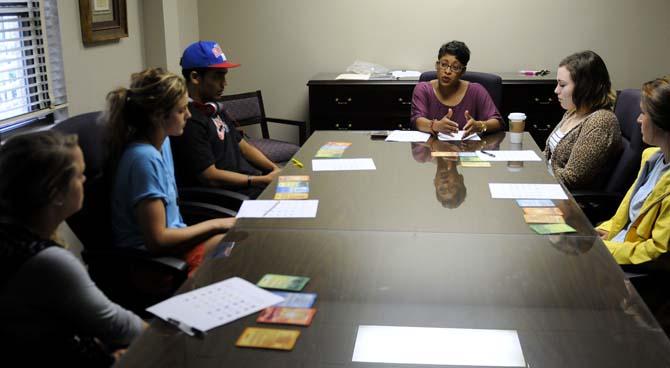It’s 8:30 in the morning. Some students may not have gotten out of bed yet, but Rachel Dorsa Bach is already at work, advising University students in 30-minute intervals from 8:30 a.m. to 12:30 p.m. Bach then gets a lunch break before returning to the office for more sessions from 1:30 p.m. to 4 p.m.
During these 30-minute sessions, she will give advice on courses for next semester, connect students with resources for personal needs and pore over countless degree audits, pointing out requirements for graduation.
Bach’s job description is simple at first glance: get students their degrees as efficiently as possible. But Bach is an adviser for the LSU Center for Advising and Counseling, where students who do not meet requirements for their senior colleges are placed. The UCAC is one of the largest colleges on campus. Around midterms, UCAC starts booking appointments two weeks in advance. All 2,489 students in UCAC are served by only seven counselors.
The American School Counselor Association recommends a ratio of one counselor per 250 students, although most institutions have significantly higher ratios. The average student to school counselor ratio is 482 students per counselor-nearly double the recommended ratio, according to Education Week.
Fellow UCAC counselor Bridget Robicheaux said this ratio has actually decreased within the past five years. Previously, there were 2,800 to 3,000 students enrolled in UCAC each semester. Unlike other colleges, decreased enrollment is a sign counselors are doing their job well.
“A decreased enrollment shows that students are entering their senior colleges sooner and therefore progressing toward graduation more quickly,” Robicheaux said.
Students may find themselves in UCAC for a number of reasons, such as transferring, changing majors or being unable to complete coursework in their chosen major within the senior colleges’ time constraints.
Even though she feels overwhelmed at times, Bach never misses an opportunity to make a personal connection with a student.
“Getting to be part of a student’s story and being alongside them in their journey to graduation is truly a privilege,” Bach said. “Getting to do so in a capacity that allows me to promote their success and maybe push them closer to graduation is the best feeling. It’s why we do what we do.”
Students in UCAC are only able to stay there for a given number of semesters before applying to a senior college. If a student has not demonstrated adequate academic progress, they may apply to stay within UCAC, but must pick a different field of study.
Bach said these conversations, where she has to tell students to choose a new path because they were taking too long, or made too many mistakes their freshman year, are difficult.
“When there is something going on for students that I cannot change, that is hard for me,” Bach said. “We don’t enjoy those conversations, but we do sincerely hope we can help problem solve and work through them with our students.”
Bach’s non-stop schedule and crowded advising appointments are typical; the beginning and middle of each semester are the busiest for counselors. During these times, it’s not uncommon for over 100 students to come through the office every day.
Even during less busy times, Bach said, counselors are working behind the scenes, trying to promote resources, reaching out to students who are struggling and sending out deadline reminders.
“This is when you see us in your inbox more frequently,” Bach said. “If you catch an academic counselor in their office without a student, they’re still very much working for their students.”
According to Robicheaux, who has been an academic counselor at the University for 14 years, more students are interested in advising appointments than ever before, despite decreased enrollment. During her tenure, she has seen the implementation of LSU W Policy, Comprehensive Academic Tracking (CATS), Plus/Minus Grading Grade Exclusion and a transition from making appointments over the phone to booking them online.
“I have seen an increased desire for individual appointments from students, more consistent weeks of being booked with appointments, and an increased desire for appointments in non-peak advising times than I did when I began working at LSU,” Robicheaux said.
Robicheaux credits increased student interest to technology advancements which have made counselors more accessible to students.
While the counselors may be stretched thin, many students say they are still effective and attentive.
Pre-nursing junior Madison Guice said she was provided individualized attention from her academic counselors after deciding to change majors halfway through college.
“I’ve always had an awesome experience with the counselors,” Guice said. “You know they have your best interest at heart.”
Guice is one of many students positively influenced by school counselors. Another is Bach herself, who was counseled by Robicheaux during her undergraduate years.
“Just as she was a support and guide for me then, she has again fallen into the role of being my mentor and teacher in doing a job we both love,” Bach said. “She’s passed her passion for her work on to me and is a constant reminder to me of why what we do matters.”
Bach said she loves her job despite the challenges and can envision herself continuing for a long time. She hopes to help students have a positive and successful journey at LSU, like Robicheaux once did for her.
“There is so much more done behind the scenes than I was ever aware of,” Bach said.
A day in the life of a counselor: LSU counselors try to meet increasing student demands, face heavy workloads
By Anna Jones
November 1, 2019
Erin Anthony, a counselor at the University Center for Freshman Year, leads a group of students during a True Colors workshop Tuesday, October 1, 2013 in Allen Hall.




